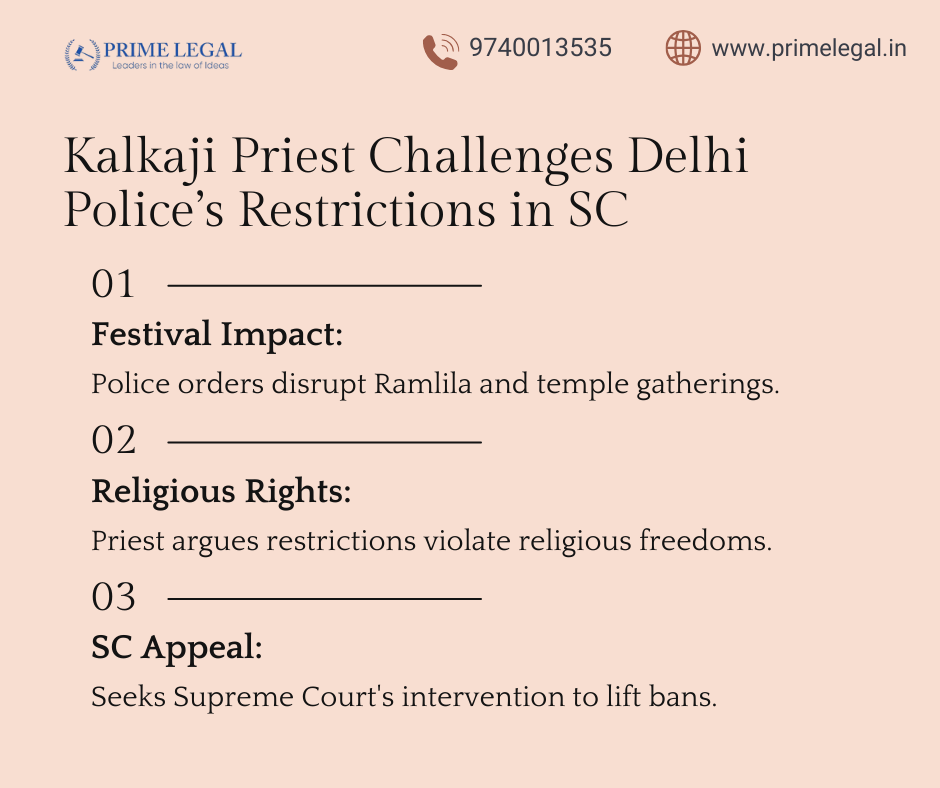BACKGROUND-
A petition was filed in the Supreme Court challenging the prohibitory order issued by the Delhi Police, which banned the assembly of five or more persons, dharna, protest etc. in Delhi from 30 September to 5 October. This prohibitory order which was issued by Delhi Police was to maintain law & order in state because Delhi Police had presumed that because of “sensitive matters” coming around this days it was necessary to issue prohibitory order.
INTRODUCTION-
The petitioner is Sunil, who is the priest of Kalkaji temple. Manas is the secretary of Naman Seva Society, which organises the grand Ramlila fair at Satpula Ground in Chirag Delhi. The petitioner said that due to the order of Delhi Police, Ramlila celebrations starting from October 3 cannot take place.
The petitioner pointed out that the religiously significant period of Navratri begins from October 3, during which many religious ceremonies and celebrations traditionally take place. The petitioner also pointed out that Dussehra and Navratri are coming up. However, the prohibitory order of the Delhi Police will put a stop to such festivals and religious gatherings.
This situation of, Kalkaji’s Priest reaching out to Supreme Court arrived because of the orders passed by the Delhi Police. He contended that the order which is issued by the Delhi Police, has no reasonable ground to do so because there have been situation where such situations had arisen but then the Delhi Police had not done so. Just because there are some “sensitive matters” going to be happening, presuming it would result to “Law & Order situation”, this argument of Delhi Police holds no merit & has no reasonable grounds to do so.
KEY ASPECTS-
On 30 September, Delhi Police Commissioner Sanjay Arora issued an order exercising powers under Section 163 of the Indian Civil Security Code (BNSS), prohibiting (i) assembly of five or more unauthorised persons, (ii) carrying firearms, banners, placards, sticks, spears, swords, rods, bricks, stones, etc., (iii) holding dharna or sit-in in any public place, etc., in all police stations having territorial jurisdiction over New Delhi, North and Central districts and on the borders of Delhi for a period of 6 days from 30 September to 5 October.
The police commissioner said the general atmosphere in Delhi was “sensitive” from the law and order point of view in view of the proposed Waqf Amendment Bill, MCD standing committee election issue, DUSU elections and calls for protests by various organisations. The police also cited the impending elections in Jammu and Kashmir and Haryana.
The petitioner argued that there was no reasonable ground for issuing the prohibitory order. The instances cited in the order are already well known in the public domain and the police should take adequate safeguards instead of issuing broad and sweeping orders against the legitimate activities of citizens.
The petition stated- “It is respectfully submitted that it appears that instead of performing its duties with regard to maintenance of law and order and crowd management, the respondent is merely attempting to evade them by attempting to restrict legitimate gatherings which normally take place in a populous and thriving metropolis like Delhi. It must also be mentioned that various other festivals for various religions have also been permitted to be held earlier without any hindrance by any order such as the impugned order. There is no reasoning in the impugned order as to why the initial days of Navratri should be treated as a separate case.”
CONCLUSION-
The petition cited the Supreme Court’s judgment in Anuradha Bhasin v/s Union of India (2020), which held that orders under Section 144 CrPC (the earlier version of Section 163 BNSS) cannot be issued routinely.
Reliance was also placed on Madhu Limaye vs SDM (1970), which held that powers under Section 144 CrPC can be issued only under exceptional circumstances.
The impugned order proves to be a serious hindrance to the normal day-to-day life of individuals and their fundamental rights under Articles 14, 19(1)(b), 19(1)(d), 21 and 25 of the Constitution of India, causing serious hindrance to the rights, life and livelihood of the citizens of Delhi. The order has also created an atmosphere of fear wherein a large number of residents of Delhi are apprehensive about the nature of the order as well as its impact on their religious beliefs and traditions.
“PRIME LEGAL is a full-service law firm that has won a National Award and has more than 20 years of experience in an array of sectors and practice areas. Prime legal fall into a category of best law firm, best lawyer, best family lawyer, best divorce lawyer, best divorce law firm, best criminal lawyer, best criminal law firm, best consumer lawyer, best civil lawyer.”
Written by- ALOK G. CHHAPARWAL


